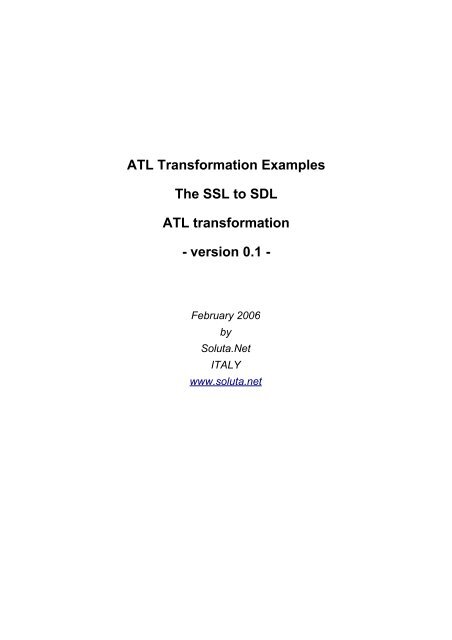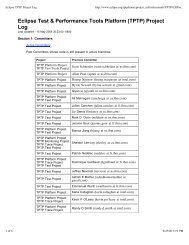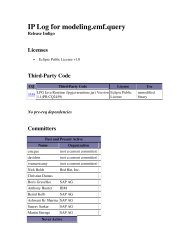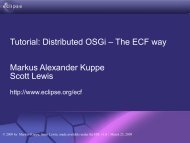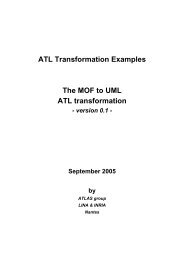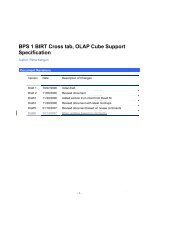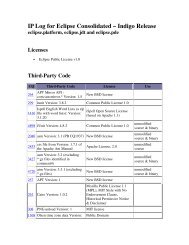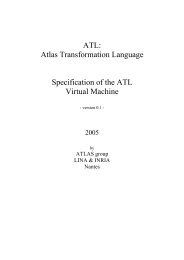ATL Transformation Examples The SSL to SDL ATL ... - Eclipse
ATL Transformation Examples The SSL to SDL ATL ... - Eclipse
ATL Transformation Examples The SSL to SDL ATL ... - Eclipse
You also want an ePaper? Increase the reach of your titles
YUMPU automatically turns print PDFs into web optimized ePapers that Google loves.
<strong>ATL</strong> <strong>Transformation</strong> <strong>Examples</strong><br />
<strong>The</strong> <strong>SSL</strong> <strong>to</strong> <strong>SDL</strong><br />
<strong>ATL</strong> transformation<br />
- version 0.1 -<br />
February 2006<br />
by<br />
Soluta.Net<br />
ITALY<br />
www.soluta.net
www.soluta.net<br />
Table of Contents<br />
<strong>ATL</strong><br />
TRANSFORMATION EXAMPLE<br />
Irina Dumitrascu<br />
idumitrascu@soluta.net<br />
Natalia Rebeja<br />
nrebeja@soluta.net<br />
<strong>SSL</strong> <strong>to</strong> <strong>SDL</strong> Date: 20/02/2006<br />
1 Abstract .............................................................................................................................................3<br />
2 Introduction....................................................................................................................................... 3<br />
3 <strong>The</strong> <strong>SSL</strong> <strong>to</strong> <strong>SDL</strong> <strong>ATL</strong> transformation...............................................................................................3<br />
3.1 <strong>Transformation</strong> overview...........................................................................................................3<br />
3.2 Metamodels................................................................................................................................3<br />
3.2.1 <strong>SSL</strong> Metamodel..................................................................................................................4<br />
3.2.2 <strong>SDL</strong> Metamodel.................................................................................................................6<br />
3.2.3 On<strong>to</strong>logy Metamodel......................................................................................................... 8<br />
3.3 Rules Specification.................................................................................................................... 9<br />
3.4 <strong>ATL</strong> code................................................................................................................................. 10<br />
3.4.1 Helpers............................................................................................................................. 10<br />
3.4.2 Rules.................................................................................................................................11<br />
Appendix I - <strong>The</strong> <strong>SSL</strong> metamodel in KM3 format.............................................................................14<br />
Appendix II - <strong>The</strong> <strong>SDL</strong> metamodel in KM3 format..........................................................................19<br />
Appendix III - <strong>The</strong> ODM metamodel in KM3 format...................................................................... 22<br />
Appendix IV - <strong>The</strong> <strong>SSL</strong> <strong>to</strong> <strong>SDL</strong> <strong>ATL</strong> code........................................................................................27<br />
2/36
www.soluta.net<br />
1 Abstract<br />
<strong>ATL</strong><br />
TRANSFORMATION EXAMPLE<br />
Irina Dumitrascu<br />
idumitrascu@soluta.net<br />
Natalia Rebeja<br />
nrebeja@soluta.net<br />
<strong>SSL</strong> <strong>to</strong> <strong>SDL</strong> Date: 20/02/2006<br />
This document describes a transformation which enables <strong>to</strong> create a <strong>SDL</strong> model from a <strong>SSL</strong> model,<br />
using an auxiliary ODM model that contains the on<strong>to</strong>logy elements referred in the <strong>SSL</strong> model.<br />
<strong>SDL</strong> is a language for describing concrete service interfaces, from a technical point of view, while<br />
<strong>SSL</strong> can be used <strong>to</strong> create semantic descriptions of services. <strong>SSL</strong> models can refer <strong>to</strong> terms defined<br />
in an external on<strong>to</strong>logy, therefore another metamodel, ODM, is used for querying on<strong>to</strong>logies.<br />
2 Introduction<br />
<strong>SSL</strong> (Semantic Service Language) is used <strong>to</strong> consistently define service description models for<br />
semantically describing services.<br />
ODM (On<strong>to</strong>logy Definition Metamodel) is used for defining business and service on<strong>to</strong>logies.<br />
<strong>SDL</strong> (Service Description Language) is a language used <strong>to</strong> describe services in a platform<br />
independent way. It allows <strong>to</strong> describe the technical interface of a service.<br />
<strong>The</strong> <strong>SSL</strong> and <strong>SDL</strong> standards are mutually related since a technical interface for a certain service can<br />
be obtained from its semantic description.<br />
<strong>The</strong> three above mentioned standards have been developed for the Digital Business Ecosystem<br />
(DBE) project. Supported by the European Commission’s 6th FP for research and development in<br />
IST, DBE 1 is a 3-year pan-European project involving 120 researchers and specialists from 20<br />
organizations, including some of the important names in the international computing and business<br />
context. <strong>The</strong> goal of the DBE Project is <strong>to</strong> build an open source environment, an Internet-based<br />
ecosystem in which business applications can be developed and used by small <strong>to</strong> medium<br />
enterprises (SMEs). It will enable end users, even those SMEs with low ICT access, <strong>to</strong> easily<br />
interact among each others and use Internet-based business applications as services for expanding<br />
their business and market, getting the benefits of intelligence, interaction and adaptation as the<br />
software evolves in response <strong>to</strong> its usage.<br />
3 <strong>The</strong> <strong>SSL</strong> <strong>to</strong> <strong>SDL</strong> <strong>ATL</strong> transformation<br />
3.1 <strong>Transformation</strong> overview<br />
<strong>The</strong> <strong>SSL</strong> <strong>to</strong> <strong>SDL</strong> transformation converts a <strong>SSL</strong> model in<strong>to</strong> a <strong>SDL</strong> model using an ODM model <strong>to</strong><br />
include the necessary data from an on<strong>to</strong>logy in<strong>to</strong> the technical specification of the service.<br />
3.2 Metamodels<br />
DBE has chosen <strong>to</strong> adopt a MDA based approach using MOF as the meta-meta-model for defining<br />
1 More details can be found at the following website: http://www.digitalecosystem.org/.<br />
3/36
www.soluta.net<br />
<strong>ATL</strong><br />
TRANSFORMATION EXAMPLE<br />
Irina Dumitrascu<br />
idumitrascu@soluta.net<br />
Natalia Rebeja<br />
nrebeja@soluta.net<br />
<strong>SSL</strong> <strong>to</strong> <strong>SDL</strong> Date: 20/02/2006<br />
all the languages that will be used <strong>to</strong> represent knowledge in DBE. <strong>The</strong> <strong>SSL</strong> <strong>to</strong> <strong>SDL</strong> transformation<br />
is based on some subsets of the <strong>SSL</strong>, <strong>SDL</strong> and ODM metamodels; these metamodels are provided,<br />
in km3 format, in Appendix I - <strong>The</strong> <strong>SSL</strong> metamodel in KM3 format 2 , Appendix II - <strong>The</strong> <strong>SDL</strong><br />
metamodel in KM3 format 3 and Appendix III - <strong>The</strong> ODM metamodel in KM3 format 4 and they are<br />
described in the following sections.<br />
3.2.1 <strong>SSL</strong> Metamodel<br />
<strong>The</strong> main concepts defined in <strong>SSL</strong> are shown in a graphical form in Illustration 1: <strong>SSL</strong> Metamodel -<br />
Service Behavior Modeling 5 , below.<br />
A ServiceProfile element contains, among others, multiple <strong>SSL</strong> ServiceFunctionality elements, each<br />
of them having multiple inputs and outputs. Each <strong>SSL</strong> ServiceInput and ServiceOutput has a Type<br />
attribute, that is interesting for the purpose of this transformation; the hierarchy of the <strong>SSL</strong><br />
TypeURI class is shown in Illustration 2: <strong>SSL</strong> Metamodel – Type referencing scheme 6 , below. As<br />
for the moment enumerated types cannot be defined outside on<strong>to</strong>logies, the types considered for this<br />
transformation are <strong>SSL</strong> On<strong>to</strong>logyClassURI and <strong>SSL</strong> DataTypeURI.<br />
2 <strong>The</strong> <strong>SSL</strong> metamodel has been developed at the Technical University of Crete (TUC) and it is available as a part of<br />
the DBE project source files and also, in XMI format, on the website<br />
http://www.music.tuc.gr/DBE/soft/metamodels/.<br />
3 <strong>The</strong> <strong>SDL</strong> metamodel has been developed by Soluta.net as part of the Deliverable D16.1: Service description<br />
Language of the DBE project (see http://www.digital-ecosystem.org/).<br />
4 <strong>The</strong> ODM metamodel has been developed at the Technical University of Crete (TUC) and it is available as a part of<br />
the DBE project source files and also, in XMI format, on the website<br />
http://www.music.tuc.gr/DBE/soft/ metamodels/ .<br />
5 Image taken from Deliverable D14: DBE Knowledge Representation Models of the DBE project (see<br />
http://www.digital-ecosystem.org/).<br />
6 Image based on Deliverable D14: DBE Knowledge Representation Models of the DBE project (see<br />
http://www.digital-ecosystem.org/).<br />
4/36
www.soluta.net<br />
<strong>ATL</strong><br />
TRANSFORMATION EXAMPLE<br />
Irina Dumitrascu<br />
idumitrascu@soluta.net<br />
Natalia Rebeja<br />
nrebeja@soluta.net<br />
<strong>SSL</strong> <strong>to</strong> <strong>SDL</strong> Date: 20/02/2006<br />
Illustration 1: <strong>SSL</strong> Metamodel - Service Behavior Modeling<br />
5/36
www.soluta.net<br />
3.2.2 <strong>SDL</strong> Metamodel<br />
<strong>ATL</strong><br />
TRANSFORMATION EXAMPLE<br />
Irina Dumitrascu<br />
idumitrascu@soluta.net<br />
Natalia Rebeja<br />
nrebeja@soluta.net<br />
<strong>SSL</strong> <strong>to</strong> <strong>SDL</strong> Date: 20/02/2006<br />
Illustration 2: <strong>SSL</strong> Metamodel – Type referencing scheme<br />
A visual description of some relevant elements from the <strong>SDL</strong> model is presented in Illustration 3:<br />
<strong>SDL</strong> Metamodel 7 , below.<br />
<strong>The</strong> root of a <strong>SDL</strong> model is a Definitions element, that contains the defined <strong>SDL</strong> types, interfaces,<br />
messages and message lists. Each interface has at least one operation, each operation containing its<br />
input and output messages and possibly exceptions.<br />
7 Image based on Deliverable D16.1: Service description Language of the DBE project (see<br />
http://www.digital-ecosystem.org/ ).<br />
6/36
www.soluta.net<br />
<strong>ATL</strong><br />
TRANSFORMATION EXAMPLE<br />
Irina Dumitrascu<br />
idumitrascu@soluta.net<br />
Natalia Rebeja<br />
nrebeja@soluta.net<br />
<strong>SSL</strong> <strong>to</strong> <strong>SDL</strong> Date: 20/02/2006<br />
Illustration 3: <strong>SDL</strong> Metamodel<br />
7/36
www.soluta.net<br />
3.2.3 On<strong>to</strong>logy Metamodel<br />
<strong>ATL</strong><br />
TRANSFORMATION EXAMPLE<br />
Irina Dumitrascu<br />
idumitrascu@soluta.net<br />
Natalia Rebeja<br />
nrebeja@soluta.net<br />
<strong>SSL</strong> <strong>to</strong> <strong>SDL</strong> Date: 20/02/2006<br />
Illustration 4: ODM Metamodel - Properties in ODM 8 , below shows the on<strong>to</strong>logy metamodel<br />
elements of interest for the presented transformation.<br />
A ODM Property has a domain and a range that, for the ODM DatatypeProperty subclass is an<br />
ODM DataRange element.<br />
Illustration 4: ODM Metamodel - Properties in ODM<br />
8 Image taken from Deliverable D14: DBE Knowledge Representation Models of the DBE project (see<br />
http://www.digital-ecosystem.org/).<br />
8/36
www.soluta.net<br />
3.3 Rules Specification<br />
<strong>ATL</strong><br />
TRANSFORMATION EXAMPLE<br />
Irina Dumitrascu<br />
idumitrascu@soluta.net<br />
Natalia Rebeja<br />
nrebeja@soluta.net<br />
<strong>SSL</strong> <strong>to</strong> <strong>SDL</strong> Date: 20/02/2006<br />
<strong>The</strong> rules <strong>to</strong> transform a <strong>SSL</strong> model <strong>to</strong> a <strong>SDL</strong> model are the following:<br />
� From the <strong>SSL</strong> root element, ServiceProfile, the <strong>SDL</strong> root element, <strong>SDL</strong> Definitions, is<br />
created. It contains the following elements:<br />
� the <strong>SDL</strong> types (that are generated)<br />
� the list of <strong>SDL</strong> Interface-s (a <strong>SDL</strong> Interface consists of all the generated <strong>SDL</strong><br />
Operations, each of them having references <strong>to</strong> its input, output and exception conditions)<br />
� the list of generated <strong>SDL</strong> SimpleMessage-s.<br />
� From each <strong>SSL</strong> ServiceFunctionality a <strong>SDL</strong> Operation is created.<br />
As a <strong>SSL</strong> ServiceFunctionality can have multiple Input(s)/Output(s) and, by contrast, in<br />
<strong>SDL</strong> each Operation must have exactly one input and one output, a “compaction” of<br />
multiple inputs/outputs in<strong>to</strong> a single message is needed and it is realized as follows:<br />
� if a given <strong>SSL</strong> ServiceFunctionality has more than one Input (it has multiple inputs) then<br />
a <strong>SDL</strong> SimpleMessage is created, having as <strong>SDL</strong> Part-s the elements obtained from the<br />
transformation of each Input's Type attribute<br />
� if a given <strong>SSL</strong> ServiceFunctionality has more than one Output (it has multiple outputs)<br />
then a <strong>SDL</strong> SimpleMessage is created, having as <strong>SDL</strong> Part-s the elements obtained from<br />
the transformation of each Output's Type attribute.<br />
� For each <strong>SSL</strong> ServiceInput that is the only input of a <strong>SSL</strong> ServiceFunctionality, a <strong>SDL</strong><br />
SimpleMessage is constructed.<br />
� From each <strong>SSL</strong> ServiceOutput that is the only output of a <strong>SSL</strong> ServiceFunctionality, a <strong>SDL</strong><br />
SimpleMessage is constructed.<br />
� From each <strong>SSL</strong> DataTypeURI (that is pointing <strong>to</strong> a XML Schema type) that is the Type<br />
attribute of a <strong>SSL</strong> ServiceInput or a <strong>SSL</strong> ServiceOutput, a <strong>SDL</strong> Part is created, referring <strong>to</strong><br />
the <strong>SDL</strong> type that corresponds <strong>to</strong> the indicated XML Schema type.<br />
From each <strong>SSL</strong> On<strong>to</strong>logyClassURI (containing the id of a ODM Class defined in the<br />
on<strong>to</strong>logy) that is the Type attribute of a <strong>SSL</strong> ServiceInput or a <strong>SSL</strong> ServiceOutput the<br />
following elements are created:<br />
� a <strong>SDL</strong> ComplexType containing a <strong>SDL</strong> Part for each ODM DatatypeProperty element<br />
that contains that On<strong>to</strong>logyClassURI in its theDomain attribute. Each generated <strong>SDL</strong><br />
Part has a reference <strong>to</strong> a type, that is the translation of the type specified in the attribute<br />
theDataRange of the corresponding ODM DatatypeProperty<br />
� if the <strong>SSL</strong> On<strong>to</strong>logyClassURI is the Type of a <strong>SSL</strong> ServiceInput included in a <strong>SSL</strong><br />
ServiceFunctionality with multiple inputs or if the <strong>SSL</strong> On<strong>to</strong>logyClassURI is the Type<br />
of a <strong>SSL</strong> ServiceOutput included in a <strong>SSL</strong> ServiceFunctionality with multiple outputs,<br />
then a <strong>SDL</strong> Part is created, referring <strong>to</strong> the <strong>SDL</strong> ComplexType that it generated.<br />
As in the current specification of the <strong>SSL</strong> metamodel the only usable TypeURI subclasses<br />
are <strong>SSL</strong> DataTypeURI and <strong>SSL</strong> On<strong>to</strong>logyClassURI, only these are considered in this<br />
9/36
www.soluta.net<br />
transformation.<br />
3.4 <strong>ATL</strong> code<br />
<strong>ATL</strong><br />
TRANSFORMATION EXAMPLE<br />
Irina Dumitrascu<br />
idumitrascu@soluta.net<br />
Natalia Rebeja<br />
nrebeja@soluta.net<br />
<strong>SSL</strong> <strong>to</strong> <strong>SDL</strong> Date: 20/02/2006<br />
<strong>The</strong> <strong>ATL</strong> code for the UML <strong>to</strong> MOF transformation is provided in Appendix IV - <strong>The</strong> <strong>SSL</strong> <strong>to</strong> <strong>SDL</strong><br />
<strong>ATL</strong> code and it is presented in the following sections.<br />
3.4.1 Helpers<br />
� getOn<strong>to</strong>logyIDName (e : String) returns String<br />
A <strong>SSL</strong>!On<strong>to</strong>logyClassURI element has a lexicalForm attribute with the following structure:<br />
#.<br />
This helper takes this value and returns the part.<br />
� getSchemaTypeName (e : String) returns String<br />
A <strong>SSL</strong>!DataTypeURI element has a lexicalForm attribute that contains the URI that points<br />
<strong>to</strong> a XMLSchema and <strong>to</strong> the desired type, in the form: #.<br />
This helper takes this value and returns the part.<br />
� getDataTypeProperties (e : String) returns Sequence of ODM!DatatypeProperty<br />
Taking a String value, this helper returns a sequence of ODM!DatatypeProperty elements<br />
that have in their theDomain property a reference <strong>to</strong> a class with the id<br />
attribute equal <strong>to</strong> that String value.<br />
� getMultipleInputs () returns Sequence of <strong>SSL</strong>!ServiceInput<br />
This helper returns a sequence containing all the <strong>SSL</strong>!ServiceInput elements that belong <strong>to</strong> a<br />
<strong>SSL</strong>!ServiceFunctionality that has multiple inputs.<br />
� getMultipleOutputs () returns Sequence of <strong>SSL</strong>!ServiceOutput<br />
Similar with getMultipleInputs(), but referring <strong>to</strong> <strong>SSL</strong>!ServiceOutput.<br />
� inputMessageName (c : <strong>SSL</strong>!On<strong>to</strong>logyClassURI) returns String<br />
This helper returns the name of the <strong>SSL</strong>!ServiceInput that has as Type the specified<br />
<strong>SSL</strong>!On<strong>to</strong>logyClassURI.<br />
� outputMessageName (c: <strong>SSL</strong>!On<strong>to</strong>logyClassURI) returns String<br />
Similar with inputMessageName(), but referring <strong>to</strong> <strong>SSL</strong>!ServiceOutput.<br />
� getTypeGenera<strong>to</strong>r () returns <strong>SSL</strong>!ServiceProfile<br />
Returns the root element of the input <strong>SSL</strong> model, as it is the one that generates the<br />
<strong>SDL</strong> types.<br />
� get<strong>SDL</strong>TypeForODM (p : ODM!DataRange) returns String<br />
Returns the name of the target pattern (in rule Definitions) that generates the <strong>SDL</strong> type that<br />
10/36
www.soluta.net<br />
<strong>ATL</strong><br />
TRANSFORMATION EXAMPLE<br />
Irina Dumitrascu<br />
idumitrascu@soluta.net<br />
Natalia Rebeja<br />
nrebeja@soluta.net<br />
<strong>SSL</strong> <strong>to</strong> <strong>SDL</strong> Date: 20/02/2006<br />
corresponds <strong>to</strong> the specified ODM!DataRange. For the types that do not have direct<br />
mapping <strong>to</strong> an <strong>SDL</strong> type, the returned target pattern name is the one name is the one<br />
returned by the helper get<strong>SDL</strong>TypeForODM_Default.<br />
� get<strong>SDL</strong>TypeForODM_Default () returns String<br />
Returns the name of the target pattern (in rule Definitions) that is assigned by default <strong>to</strong><br />
elements from the on<strong>to</strong>logy whose type is not mapped directly <strong>to</strong> a <strong>SDL</strong> type (the pattern<br />
that generates <strong>SDL</strong>!SdlString).<br />
� get<strong>SDL</strong>TypeForSchemaType (e : String) returns String<br />
Returns the name of the target pattern (in rule Definitions) that generates the <strong>SDL</strong> type that<br />
corresponds <strong>to</strong> the schema type with the specified name. (<strong>The</strong> mapping realized for the<br />
schema: http://www.w3.org/2001/XMLSchema.)<br />
For the types that do not have direct mapping <strong>to</strong> an <strong>SDL</strong> type, the returned target pattern<br />
name is the one corresponding <strong>to</strong> <strong>SDL</strong>!String.<br />
� getFakeDatatypeSequence (e : Sequence(ODM!DatatypeProperty)) returns<br />
Sequence(String)<br />
Returns a sequence containing a 'fake' element if the size of the provided sequence is 0,<br />
otherwise it returns an empty sequence.<br />
� getInputOutputHavingURIType (e: <strong>SSL</strong>!DataTypeURI) returns<br />
Sequence(<strong>SSL</strong>!FunctionalityParameter)<br />
Returns a sequence of all the <strong>SSL</strong>!ServiceInput and <strong>SSL</strong>!ServiceOutput that have the Type<br />
attribute equal <strong>to</strong> the specified <strong>SSL</strong>!DataTypeURI.<br />
3.4.2 Rules<br />
� TypeFromOn<strong>to</strong>logy_Input<br />
An <strong>SSL</strong>!On<strong>to</strong>logyClassURI element contains the id of an element in the associated<br />
on<strong>to</strong>logy. For every <strong>SSL</strong>!On<strong>to</strong>logyClassURI element that is the Type attribute of a<br />
<strong>SSL</strong>!ServiceInput, this rule creates:<br />
1) a <strong>SDL</strong>!ComplexType that has a <strong>SDL</strong>!Part for each ODM!DatatypeProperty in which this<br />
class is referred (by id). If there is no such ODM!DatatypeProperty, by default a <strong>SDL</strong>!Part<br />
with the type <strong>SDL</strong>!String is created<br />
2) if this element is the Type of a <strong>SSL</strong>!ServiceInput that belongs <strong>to</strong> a<br />
<strong>SSL</strong>!ServiceFunctionality with multiple inputs, then a <strong>SDL</strong>!Part that has a reference <strong>to</strong> the<br />
generated <strong>SDL</strong>!ComplexType is created(and it will be included in the element obtained<br />
from the transformation of that <strong>SSL</strong>!ServiceFunctionality)<br />
� TypeFromOn<strong>to</strong>logy_Output<br />
<strong>The</strong> same transformation as TypeFromOn<strong>to</strong>logy_Input, but for types that belong <strong>to</strong> a<br />
11/36
www.soluta.net<br />
ServiceOutput.<br />
<strong>ATL</strong><br />
TRANSFORMATION EXAMPLE<br />
Irina Dumitrascu<br />
idumitrascu@soluta.net<br />
Natalia Rebeja<br />
nrebeja@soluta.net<br />
<strong>SSL</strong> <strong>to</strong> <strong>SDL</strong> Date: 20/02/2006<br />
� TypeFromSchema<br />
A <strong>SSL</strong>!DataTypeURI element refers <strong>to</strong> a type defined in a specified XMLSchema.<br />
For every <strong>SSL</strong>!DataTypeURI element that is the Type attribute of a <strong>SSL</strong>!ServiceInput or a<br />
<strong>SSL</strong>!ServiceOutput, this rule creates a <strong>SDL</strong>!Part that refers <strong>to</strong> the corresponding <strong>SDL</strong> type<br />
(see the helper get<strong>SDL</strong>TypeForSchemaType).<br />
� SingleInput_NonOn<strong>to</strong>logy<br />
For every <strong>SSL</strong>!ServiceInput that is the only input of a <strong>SSL</strong>!ServiceFunctionality and whose<br />
type is not <strong>SSL</strong>!On<strong>to</strong>logyClassURI, this rules construct a <strong>SDL</strong>!SimpleMessage that<br />
describes it (the type of the input is transformed according <strong>to</strong> the rule TypeFromSchema).<br />
� SingleOutput_NonOn<strong>to</strong>logy<br />
<strong>The</strong> same transformation as SingleInput_NonOn<strong>to</strong>logy, but for <strong>SSL</strong>!ServiceOutput.<br />
� SingleInput_On<strong>to</strong>logy<br />
For every <strong>SSL</strong>!ServiceInput that is the only input of a <strong>SSL</strong>!ServiceFunctionality and whose<br />
type is <strong>SSL</strong>!On<strong>to</strong>logyClassURI (it is described in the on<strong>to</strong>logy), this rules construct a<br />
<strong>SDL</strong>!SimpleMessage that describes it (the message contains a single <strong>SDL</strong>!Part that refers <strong>to</strong><br />
the complex type generated from the input's type - see rule TypeFromOn<strong>to</strong>logy_Input:<br />
part_c).<br />
� SingleOutput_On<strong>to</strong>logy<br />
<strong>The</strong> same transformation as SingleInput_On<strong>to</strong>logy, but for <strong>SSL</strong>!ServiceOutput.<br />
� ServiceFunctionality11<br />
For every <strong>SSL</strong>!ServiceFunctionality that has a single input and a single output, this rule<br />
constructs a <strong>SDL</strong>!Operation that contains the results of the input's and output's<br />
transformation (see rules SingleInput_On<strong>to</strong>logy, SingleInput_NonOn<strong>to</strong>logy and their<br />
correspondents for output messages).<br />
� ServiceFunctionalityN1<br />
For every <strong>SSL</strong>!ServiceFunctionality that has multiple inputs and a single output, this rule<br />
constructs a <strong>SDL</strong>!Operation that contains the results of the output's transformation (see rules<br />
SingleOutput_On<strong>to</strong>logy, SingleOutput_NonOn<strong>to</strong>logy) and that constructs a <strong>SDL</strong>!Message<br />
in which it "compacts" the inputs by placing, as parts, the results of the transformation of<br />
each input's type (see rules TypeFromOn<strong>to</strong>logy_Input: part_c and TypeFromSchema:<br />
part_c).<br />
� ServiceFunctionality1N<br />
For every <strong>SSL</strong>!ServiceFunctionality that has a single input and multiple outputs, this rule<br />
constructs a <strong>SDL</strong>!Operation that contains the results of the input's transformation (see rules<br />
SingleInput_On<strong>to</strong>logy, SingleInput_NonOn<strong>to</strong>logy) and that constructs a <strong>SDL</strong>!Message in<br />
12/36
www.soluta.net<br />
<strong>ATL</strong><br />
TRANSFORMATION EXAMPLE<br />
Irina Dumitrascu<br />
idumitrascu@soluta.net<br />
Natalia Rebeja<br />
nrebeja@soluta.net<br />
<strong>SSL</strong> <strong>to</strong> <strong>SDL</strong> Date: 20/02/2006<br />
which it "compacts" the outputs by placing, as parts, the results of the transformation of<br />
each output's type (see rules TypeFromOn<strong>to</strong>logy_Output: part_c and TypeFromSchema:<br />
part_c).<br />
� ServiceFunctionalityNN<br />
For every <strong>SSL</strong>!ServiceFunctionality that has multiple inputs and multiple outputs, this rule<br />
constructs a <strong>SDL</strong>!Operation that contains: - a <strong>SDL</strong>!Message in which it "compacts" the<br />
inputs by placing, as parts, the results of the transformation of each input's type (see rules<br />
TypeFromOn<strong>to</strong>logy_Input: part_c and TypeFromSchema: part_c) - a <strong>SDL</strong>!Message in<br />
which it "compacts" the outputs by placing, as parts, the results of the transformation of<br />
each output's type (see rules TypeFromOn<strong>to</strong>logy_Output: part_c and TypeFromSchema:<br />
part_c).<br />
� Definitions<br />
<strong>The</strong> main rule of the transformation, that constructs the skele<strong>to</strong>n of the <strong>SDL</strong> model and uses<br />
the results of the other rules in order <strong>to</strong> fill it. It creates the <strong>SDL</strong> types definitions, generates<br />
the definitions of the interfaces (containing the generated operations) and groups the<br />
generated messages.<br />
13/36
www.soluta.net<br />
<strong>ATL</strong><br />
TRANSFORMATION EXAMPLE<br />
Appendix I - <strong>The</strong> <strong>SSL</strong> metamodel in KM3 format<br />
package PrimitiveTypes {<br />
}<br />
datatype Integer;<br />
datatype Long;<br />
datatype Float;<br />
datatype Double;<br />
datatype Boolean;<br />
datatype String;<br />
package <strong>SSL</strong> {<br />
package Instantiation {<br />
Irina Dumitrascu<br />
idumitrascu@soluta.net<br />
Natalia Rebeja<br />
nrebeja@soluta.net<br />
<strong>SSL</strong> <strong>to</strong> <strong>SDL</strong> Date: 20/02/2006<br />
class PropertyInstance extends <strong>SSL</strong>Instance {<br />
reference Value : Value;<br />
attribute InstanceOf : On<strong>to</strong>logyPropertyURI;<br />
attribute name : String;<br />
}<br />
class ClassInstance extends Value, <strong>SSL</strong>Instance {<br />
reference Property container : PropertyInstance;<br />
attribute InstanceOf : On<strong>to</strong>logyClassURI;<br />
attribute name : String;<br />
}<br />
class ContactInstance extends <strong>SSL</strong>Instance {<br />
reference contType : ContactInformation;<br />
reference Value : Value;<br />
attribute InAssociation[0-1] : String;<br />
}<br />
class ParamInstance extends <strong>SSL</strong>Instance {<br />
reference Value : Value;<br />
reference paramType : ServiceParameter;<br />
attribute InAssociation : String;<br />
attribute paramTypeID : String;<br />
}<br />
14/36
www.soluta.net<br />
}<br />
abstract class Value {<br />
}<br />
<strong>ATL</strong><br />
TRANSFORMATION EXAMPLE<br />
class AttrInstance extends <strong>SSL</strong>Instance {<br />
reference Value : Value;<br />
reference AtrrType : ServiceAttribute;<br />
attribute AttrTypeID : String;<br />
}<br />
Irina Dumitrascu<br />
idumitrascu@soluta.net<br />
Natalia Rebeja<br />
nrebeja@soluta.net<br />
<strong>SSL</strong> <strong>to</strong> <strong>SDL</strong> Date: 20/02/2006<br />
class ProfileInstance extends <strong>SSL</strong>Instance {<br />
reference contInstance[*] container : ContactInstance;<br />
reference paramInstance[*] container : ParamInstance;<br />
reference profType : ServiceProfile;<br />
reference AtrrInstance[*] container : AttrInstance;<br />
attribute ProfTypeID : String;<br />
}<br />
abstract class <strong>SSL</strong>Instance {<br />
attribute InstanceID : String;<br />
}<br />
package Types {<br />
class On<strong>to</strong>logyPropertyURI extends URIReference {<br />
}<br />
class Literal extends Value {<br />
attribute LexicalForm : String;<br />
}<br />
class On<strong>to</strong>logyClassURI extends TypeURI {<br />
}<br />
class On<strong>to</strong>logyThingURI extends URIReference {<br />
}<br />
abstract class URIReference {<br />
attribute lexicalform : String;<br />
}<br />
abstract class TypeURI extends URIReference {<br />
}<br />
15/36
www.soluta.net<br />
}<br />
<strong>ATL</strong><br />
TRANSFORMATION EXAMPLE<br />
class EnumTypeURI extends DataRangeURI {<br />
}<br />
class DataTypeURI extends DataRangeURI {<br />
}<br />
Irina Dumitrascu<br />
idumitrascu@soluta.net<br />
Natalia Rebeja<br />
nrebeja@soluta.net<br />
<strong>SSL</strong> <strong>to</strong> <strong>SDL</strong> Date: 20/02/2006<br />
abstract class DataRangeURI extends TypeURI {<br />
}<br />
class Multiplicity {<br />
attribute LowerBound : Integer;<br />
attribute UpperBound[0-1] : Integer;<br />
}<br />
package Associations {<br />
}<br />
class Target extends AssociationEnd {<br />
}<br />
class Source extends AssociationEnd {<br />
}<br />
abstract class AssociationEnd extends ServiceConcept {<br />
reference EndType : ServiceConcept;<br />
attribute Multiplicity : Multiplicity;<br />
}<br />
class Association extends ServiceConcept {<br />
reference TargetEnd container : Target;<br />
reference SourceEnd container : Source;<br />
}<br />
package ServiceBehavior {<br />
class ServiceOutput extends FunctionalityParameter {<br />
reference coCondition[0-1] : Condition;<br />
}<br />
class ServiceInput extends FunctionalityParameter {<br />
}<br />
16/36
www.soluta.net<br />
}<br />
<strong>ATL</strong><br />
TRANSFORMATION EXAMPLE<br />
Irina Dumitrascu<br />
idumitrascu@soluta.net<br />
Natalia Rebeja<br />
nrebeja@soluta.net<br />
<strong>SSL</strong> <strong>to</strong> <strong>SDL</strong> Date: 20/02/2006<br />
class ServiceFunctionality extends ServiceConcept {<br />
reference Output[*] container : ServiceOutput;<br />
reference preCondition[0-1] : Condition;<br />
reference Input[*] container : ServiceInput;<br />
}<br />
abstract class FunctionalityParameter extends ServiceConcept {<br />
attribute Type : TypeURI;<br />
}<br />
class Condition extends ServiceConcept {<br />
attribute ConditionExpression : String;<br />
}<br />
package Core {<br />
class XYCoordinates {<br />
attribute X : Integer;<br />
attribute Y : Integer;<br />
}<br />
class ContactInformation extends ServiceConcept {<br />
attribute Type : TypeURI;<br />
}<br />
class ServiceProfile extends NameSpace {<br />
reference Functionality[*] container : ServiceFunctionality;<br />
reference Domain[1-*] : DBEServiceDomain;<br />
reference Attribute[*] container : ServiceAttribute;<br />
reference Category[*] : IndustryDomain;<br />
reference Identifier container : ServiceIdentifier;<br />
}<br />
class ServiceParameter extends ServiceConcept {<br />
attribute Type : TypeURI;<br />
}<br />
class ServiceIdentifier extends ServiceConcept {<br />
attribute Type : DataTypeURI;<br />
}<br />
17/36
}<br />
www.soluta.net<br />
}<br />
<strong>ATL</strong><br />
TRANSFORMATION EXAMPLE<br />
Irina Dumitrascu<br />
idumitrascu@soluta.net<br />
Natalia Rebeja<br />
nrebeja@soluta.net<br />
<strong>SSL</strong> <strong>to</strong> <strong>SDL</strong> Date: 20/02/2006<br />
class DBEServiceDomain extends ServiceConcept {<br />
attribute DomainRef : On<strong>to</strong>logyClassURI;<br />
}<br />
class IndustryDomain extends ServiceConcept {<br />
attribute TaxonomyName : String;<br />
attribute TaxonomyRef[0-1] : URIReference;<br />
}<br />
class ServiceAttribute extends ServiceConcept {<br />
attribute AttributeType : TypeURI;<br />
attribute Multiplicity : Multiplicity;<br />
}<br />
abstract class NameSpace extends ServiceConcept {<br />
reference OwnedElement[*] container : ServiceConcept;<br />
}<br />
class SemanticPackage extends NameSpace {<br />
reference profInstance[*] container : ProfileInstance;<br />
}<br />
abstract class ServiceConcept {<br />
reference Position[0-1] container : XYCoordinates;<br />
attribute name : String;<br />
attribute id : String;<br />
attribute Documentation[0-1] : String;<br />
}<br />
18/36
www.soluta.net<br />
<strong>ATL</strong><br />
TRANSFORMATION EXAMPLE<br />
Appendix II - <strong>The</strong> <strong>SDL</strong> metamodel in KM3 format<br />
package sdl {<br />
abstract class Element {<br />
attribute ElName : String;<br />
}<br />
abstract class DocumentedElement extends Element {<br />
}<br />
Irina Dumitrascu<br />
idumitrascu@soluta.net<br />
Natalia Rebeja<br />
nrebeja@soluta.net<br />
<strong>SSL</strong> <strong>to</strong> <strong>SDL</strong> Date: 20/02/2006<br />
abstract class SemanticElement extends DocumentedElement {<br />
attribute on<strong>to</strong>logyReference[0-1] : String;<br />
}<br />
class Definitions extends SemanticElement {<br />
reference cmpMessageList[*] container : MessageList;<br />
reference cmpMessage[*] ordered container : SimpleMessage;<br />
reference cmpInterface[1-*] ordered container : Interface;<br />
reference cmpType[*] ordered container : Type;<br />
}<br />
class Interface extends SemanticElement {<br />
reference cmpOperation[1-*] ordered container : Operation;<br />
}<br />
class SimpleMessage extends Message {<br />
reference cmpPart[1-*] ordered container : Part;<br />
}<br />
class Operation extends SemanticElement {<br />
reference refOutputMessage : SimpleMessage;<br />
reference refInputMessage : SimpleMessage;<br />
reference refFunctionalException[0-1] : MessageList;<br />
reference refTechnicalException[0-1] : MessageList;<br />
}<br />
class Part extends SemanticElement {<br />
reference refPart : Type;<br />
attribute optional[0-1] : Boolean;<br />
attribute isArray[0-1] : Boolean;<br />
}<br />
class Type extends SemanticElement {<br />
}<br />
19/36
}<br />
www.soluta.net<br />
<strong>ATL</strong><br />
TRANSFORMATION EXAMPLE<br />
Irina Dumitrascu<br />
idumitrascu@soluta.net<br />
Natalia Rebeja<br />
nrebeja@soluta.net<br />
<strong>SSL</strong> <strong>to</strong> <strong>SDL</strong> Date: 20/02/2006<br />
class ComplexType extends Type {<br />
reference cmpPart[1-*] ordered container : Part;<br />
}<br />
abstract class SimpleType extends Type {<br />
}<br />
class SdlString extends SimpleType {<br />
}<br />
class SdlReal extends SimpleType {<br />
}<br />
class SdlInteger extends SimpleType {<br />
}<br />
class SdlBoolean extends SimpleType {<br />
}<br />
class SdlDateTime extends SimpleType {<br />
}<br />
class SdlUri extends SimpleType {<br />
}<br />
class MessageList extends Message {<br />
reference cmpMessageList[*] ordered : SimpleMessage;<br />
}<br />
abstract class Message extends SemanticElement {<br />
}<br />
package PrimitiveTypes {<br />
datatype Integer;<br />
datatype Long;<br />
datatype Float;<br />
datatype Double;<br />
datatype Boolean;<br />
20/36
}<br />
www.soluta.net<br />
datatype String;<br />
<strong>ATL</strong><br />
TRANSFORMATION EXAMPLE<br />
Irina Dumitrascu<br />
idumitrascu@soluta.net<br />
Natalia Rebeja<br />
nrebeja@soluta.net<br />
<strong>SSL</strong> <strong>to</strong> <strong>SDL</strong> Date: 20/02/2006<br />
21/36
www.soluta.net<br />
<strong>ATL</strong><br />
TRANSFORMATION EXAMPLE<br />
Appendix III - <strong>The</strong> ODM metamodel in KM3 format<br />
package ODM {<br />
package Classes {<br />
}<br />
abstract class ValueRange {<br />
}<br />
abstract class Value {<br />
}<br />
class DeprecatedClass extends Class {<br />
}<br />
Irina Dumitrascu<br />
idumitrascu@soluta.net<br />
Natalia Rebeja<br />
nrebeja@soluta.net<br />
<strong>SSL</strong> <strong>to</strong> <strong>SDL</strong> Date: 20/02/2006<br />
class Class extends ValueRange, NamedElement {<br />
reference theTargetDisjointClass[*] : Class;<br />
reference theAnnotationProperty[*] : AnnotationProperty;<br />
reference theComplemented[0-1] : Class;<br />
reference theInstance[*] : ClassThing;<br />
reference theMember[*] : Class;<br />
reference theTargetEquivalent[*] : Class;<br />
reference theSuperClass[*] : Class;<br />
reference theIntersected[*] : Class;<br />
attribute complete : Boolean;<br />
}<br />
class Restriction extends Class {<br />
reference theProperty : Property;<br />
reference theCardinality[0-1] : NonNegativeInteger;<br />
reference theValue[0-1] : Value;<br />
reference theMaxCardinality[0-1] : NonNegativeInteger;<br />
reference theMinCardinality[0-1] : NonNegativeInteger;<br />
reference theAValueRange[0-1] : ValueRange;<br />
reference theSValuesRange[0-1] : ValueRange;<br />
}<br />
package Datatypes {<br />
class Enumeration extends DataRange, NamedElement {<br />
reference Enumera<strong>to</strong>r[1-*] ordered : Literal;<br />
}<br />
22/36
www.soluta.net<br />
}<br />
<strong>ATL</strong><br />
TRANSFORMATION EXAMPLE<br />
class PrimitiveType extends Datatype {<br />
}<br />
class TypedLiteral extends Literal {<br />
reference theType : URIreference;<br />
}<br />
class PlainLiteral extends Literal {<br />
attribute Language : String;<br />
}<br />
Irina Dumitrascu<br />
idumitrascu@soluta.net<br />
Natalia Rebeja<br />
nrebeja@soluta.net<br />
<strong>SSL</strong> <strong>to</strong> <strong>SDL</strong> Date: 20/02/2006<br />
class URIreference extends Literal, AnnotationObject {<br />
}<br />
class NonNegativeInteger extends TypedLiteral {<br />
}<br />
class Literal extends Value, Element, AnnotationObject {<br />
attribute lexicalForm : String;<br />
}<br />
abstract class DataRange extends ValueRange, Element {<br />
}<br />
class DepricatedDatatype extends Datatype {<br />
}<br />
class Datatype extends DataRange, NamedElement {<br />
reference TypeDefinitionURI : URIreference;<br />
}<br />
package Individuals {<br />
class DataTypePropertyThing extends Thing {<br />
reference Type : DatatypeProperty;<br />
reference <strong>The</strong>DTPRange : Literal;<br />
reference <strong>The</strong>DTPDomain : ClassThing;<br />
}<br />
class ObjectPropertyThing extends Thing {<br />
reference <strong>The</strong>OPDomain : ClassThing;<br />
reference <strong>The</strong>OPRange : ClassThing;<br />
reference Type : ObjectProperty;<br />
}<br />
23/36
www.soluta.net<br />
}<br />
<strong>ATL</strong><br />
TRANSFORMATION EXAMPLE<br />
Irina Dumitrascu<br />
idumitrascu@soluta.net<br />
Natalia Rebeja<br />
nrebeja@soluta.net<br />
<strong>SSL</strong> <strong>to</strong> <strong>SDL</strong> Date: 20/02/2006<br />
class ClassThing extends Value, Thing, AnnotationObject {<br />
reference theAnnotationProperty[*] : AnnotationProperty;<br />
reference Type[1-*] : Class;<br />
attribute name : String;<br />
}<br />
class AllDifferent extends Element {<br />
reference Member[*] : Thing;<br />
}<br />
abstract class Thing extends Element {<br />
reference theTargetSameThing[*] : Thing;<br />
reference theTargetDifferentThing[*] : Thing;<br />
attribute id : String;<br />
}<br />
package On<strong>to</strong>logy {<br />
}<br />
class On<strong>to</strong>logyProperty extends NamedElement {<br />
reference Domain[1-*] : On<strong>to</strong>logy;<br />
reference Range[1-*] : On<strong>to</strong>logy;<br />
}<br />
class On<strong>to</strong>logy extends NameSpace {<br />
reference theAnnotationProperty[*] : AnnotationProperty;<br />
}<br />
package Properties {<br />
class deprecatedDatatypeProperty extends DatatypeProperty {<br />
}<br />
class FunctionalDatatypeProperty extends DatatypeProperty {<br />
}<br />
class DeprecatedObejctProperty extends ObjectProperty {<br />
}<br />
class FunctionalObjectProperty extends ObjectProperty {<br />
}<br />
24/36
www.soluta.net<br />
}<br />
<strong>ATL</strong><br />
TRANSFORMATION EXAMPLE<br />
Irina Dumitrascu<br />
idumitrascu@soluta.net<br />
Natalia Rebeja<br />
nrebeja@soluta.net<br />
<strong>SSL</strong> <strong>to</strong> <strong>SDL</strong> Date: 20/02/2006<br />
class InverseFunctionalProperty extends ObjectProperty {<br />
}<br />
class TransitiveProperty extends ObjectProperty {<br />
}<br />
class SymmetricProperty extends ObjectProperty {<br />
}<br />
class DatatypeProperty extends Property {<br />
reference theDataRange : DataRange;<br />
}<br />
class ObjectProperty extends Property {<br />
reference theRange[*] : Class;<br />
reference theTargetInverse[0-1] : ObjectProperty;<br />
}<br />
abstract class Property extends NamedElement {<br />
reference theDomain[*] : Class;<br />
reference theTargetEquivalent[*] : Property;<br />
reference theAnnotationProperty[*] : AnnotationProperty;<br />
reference theSuperProperty[*] : Property;<br />
}<br />
package Core {<br />
abstract class NamedElement extends Element {<br />
attribute name : String;<br />
attribute id : String;<br />
}<br />
abstract class NameSpace extends NamedElement {<br />
reference OwnedElement[*] container : Element;<br />
}<br />
abstract class AnnotationObject {<br />
}<br />
class AnnotationProperty extends NamedElement {<br />
reference theAnnotationObject : AnnotationObject;<br />
}<br />
25/36
}<br />
www.soluta.net<br />
}<br />
abstract class Element {<br />
}<br />
package PrimitiveTypes {<br />
}<br />
datatype Integer;<br />
datatype Long;<br />
datatype Float;<br />
datatype Double;<br />
datatype Boolean;<br />
datatype String;<br />
<strong>ATL</strong><br />
TRANSFORMATION EXAMPLE<br />
Irina Dumitrascu<br />
idumitrascu@soluta.net<br />
Natalia Rebeja<br />
nrebeja@soluta.net<br />
<strong>SSL</strong> <strong>to</strong> <strong>SDL</strong> Date: 20/02/2006<br />
26/36
www.soluta.net<br />
<strong>ATL</strong><br />
TRANSFORMATION EXAMPLE<br />
Appendix IV - <strong>The</strong> <strong>SSL</strong> <strong>to</strong> <strong>SDL</strong> <strong>ATL</strong> code<br />
module <strong>SSL</strong>2<strong>SDL</strong>;<br />
create OUT : <strong>SDL</strong> from IN : <strong>SSL</strong>, IN2 : ODM;<br />
Irina Dumitrascu<br />
idumitrascu@soluta.net<br />
Natalia Rebeja<br />
nrebeja@soluta.net<br />
<strong>SSL</strong> <strong>to</strong> <strong>SDL</strong> Date: 20/02/2006<br />
-- A <strong>SSL</strong>!On<strong>to</strong>logyClassURI element has a lexicalForm attribute with<br />
-- the following structure: #.<br />
-- This helper takes this value and returns the part.<br />
helper def : getOn<strong>to</strong>logyIDName(e : String) : String =<br />
e.substring(e.indexOf('#') + 2, e.size())<br />
;<br />
-- A <strong>SSL</strong>!DataTypeURI element has a lexicalForm attribute that<br />
-- contains the URI that points <strong>to</strong> a XMLSchema and <strong>to</strong> the desired type,<br />
-- in the form: #<br />
-- This helper takes this value and returns the part.<br />
helper def : getSchemaTypeName(e : String) : String =<br />
e.substring(e.indexOf('#') + 2, e.size())<br />
;<br />
-- Taking a String value, this helper returns a sequence of<br />
-- ODM!DatatypeProperty elements that have in their theDomain property<br />
-- a reference <strong>to</strong> a class with the id attribute equal <strong>to</strong> that String<br />
-- value.<br />
helper def: getDataTypeProperties(input : String) :<br />
Sequence(ODM!DatatypeProperty) =<br />
ODM!DatatypeProperty.allInstances() -> select(e | e.theDomain -><br />
collect (d | d.id) -> includes (input))<br />
;<br />
-- This helper returns a sequence containing all the <strong>SSL</strong>!ServiceInput<br />
-- elements that belong <strong>to</strong> a <strong>SSL</strong>!ServiceFunctionality that has<br />
-- multiple inputs<br />
helper def: getMultipleInputs() : Sequence(<strong>SSL</strong>!ServiceInput) =<br />
<strong>SSL</strong>!ServiceFunctionality.allInstances() -> select(e | e.Input.size() > 1)<br />
-> collect(e | e.Input) -> flatten()<br />
;<br />
-- Similar with getMultipleInputs(), but referring <strong>to</strong> <strong>SSL</strong>!ServiceOutput.<br />
helper def: getMultipleOutputs() : Sequence(<strong>SSL</strong>!ServiceOutput) =<br />
<strong>SSL</strong>!ServiceFunctionality.allInstances() -> select(e | e.Output.size() > 1)<br />
-> collect(e | e.Output) -> flatten()<br />
;<br />
-- This helper returns the name of the <strong>SSL</strong>!ServiceInput that has as<br />
27/36
www.soluta.net<br />
<strong>ATL</strong><br />
TRANSFORMATION EXAMPLE<br />
Irina Dumitrascu<br />
idumitrascu@soluta.net<br />
Natalia Rebeja<br />
nrebeja@soluta.net<br />
<strong>SSL</strong> <strong>to</strong> <strong>SDL</strong> Date: 20/02/2006<br />
-- Type the specified <strong>SSL</strong>!On<strong>to</strong>logyClassURI.<br />
helper def: inputMessageName(searchedType: <strong>SSL</strong>!On<strong>to</strong>logyClassURI) : String =<br />
<strong>SSL</strong>!ServiceInput.allInstances() -> select(e | e.Type = searchedType) -><br />
collect(e | e.name) -> asSequence() -> first()<br />
;<br />
-- Similar with inputMessageName(), but referring <strong>to</strong> <strong>SSL</strong>!ServiceOutput.<br />
helper def: outputMessageName(searchedType: <strong>SSL</strong>!On<strong>to</strong>logyClassURI) : String =<br />
<strong>SSL</strong>!ServiceOutput.allInstances() -> select(e | e.Type = searchedType) -><br />
collect(e | e.name) -> asSequence() -> first()<br />
;<br />
-- Returns the root element of the input <strong>SSL</strong> model, as it is the one<br />
-- that generates the <strong>SDL</strong> types.<br />
helper def: getTypeGenera<strong>to</strong>r() : <strong>SSL</strong>!ServiceProfile =<br />
<strong>SSL</strong>!ServiceProfile.allInstances()->asSequence()->first()<br />
;<br />
-- Returns the name of the target pattern (in rule Definitions) that<br />
-- generates the <strong>SDL</strong> type that corresponds <strong>to</strong> the specified ODM!DataRange.<br />
-- For the types that do not have direct mapping <strong>to</strong> an <strong>SDL</strong> type, the<br />
-- returned target pattern name is the one corresponding <strong>to</strong> <strong>SDL</strong>!String.<br />
helper def: get<strong>SDL</strong>TypeForODM(p : ODM!DataRange) : String =<br />
if p.oclIsKindOf(ODM!PrimitiveType) then<br />
thisModule.get<strong>SDL</strong>TypeForSchemaType(<br />
thisModule.getSchemaTypeName(p.TypeDefinitionURI.lexicalForm))<br />
else thisModule.get<strong>SDL</strong>TypeForODM_Default()<br />
endif<br />
;<br />
-- Returns the name of the target pattern (in rule Definitions) that is<br />
-- assigned by default <strong>to</strong> elements from the on<strong>to</strong>logy whose type is not mapped<br />
-- directly <strong>to</strong> a <strong>SDL</strong> type.<br />
helper def: get<strong>SDL</strong>TypeForODM_Default() : String =<br />
'type4'<br />
;<br />
-- Returns the name of the target pattern (in rule Definitions) that<br />
-- generates the <strong>SDL</strong> type that corresponds <strong>to</strong> the schema type with the<br />
-- specified name. (<strong>The</strong> mapping realized for the schema:<br />
-- http://www.w3.org/2001/XMLSchema.)<br />
-- For the types that do not have direct mapping <strong>to</strong> an <strong>SDL</strong> type, the<br />
-- returned target pattern name is the one corresponding <strong>to</strong> <strong>SDL</strong>!String.<br />
helper def: get<strong>SDL</strong>TypeForSchemaType(name : String) : String =<br />
if name = 'integer' or<br />
name = 'positiveInteger' or name = 'nonPositiveInteger' or<br />
28/36
;<br />
www.soluta.net<br />
<strong>ATL</strong><br />
TRANSFORMATION EXAMPLE<br />
Irina Dumitrascu<br />
idumitrascu@soluta.net<br />
Natalia Rebeja<br />
nrebeja@soluta.net<br />
<strong>SSL</strong> <strong>to</strong> <strong>SDL</strong> Date: 20/02/2006<br />
name = 'negativeInteger' or name = 'nonNegativeInteger' or<br />
name = 'long' or name = 'int' or name = 'short' or name = 'byte' or<br />
name = 'unsignedLong' or name = 'unsignedInt' or<br />
name = 'unsignedShort' or name = 'unsignedByte'<br />
then 'type1' -- <strong>SDL</strong>!SdlInteger<br />
else if name = 'boolean'<br />
then 'type2' -- <strong>SDL</strong>!SdlBoolean<br />
else if name = 'decimal' or name = 'float' or name = 'double'<br />
then 'type3' -- <strong>SDL</strong>!SdlReal<br />
else if name = 'dateTime' or name = 'date' or name = 'time' or<br />
name = 'gYearMonth' or name = 'gMonthDay' or<br />
name = 'gYear' or name = 'gMonth' or name = 'gDay'<br />
then 'type5' -- <strong>SDL</strong>!SdlDateTime<br />
else if name = 'string' or name = 'normalizedString' or<br />
name = '<strong>to</strong>ken' or name = 'language' or<br />
name = 'NMTOKEN' or<br />
name = 'Name' or name = 'NCName' or<br />
name = 'hexBinary' or name = 'base64Binary'<br />
then 'type4' -- <strong>SDL</strong>!SdlString<br />
else 'type4' -- default for unsupported<br />
-- types: <strong>SDL</strong>!SdlString<br />
endif<br />
endif<br />
endif<br />
endif<br />
endif<br />
-- Returns a sequence with a 'fake' element if the size of the<br />
-- provided sequence is 0, otherwise it returns an empty sequence.<br />
helper def: getFakeDatatypeSequence(m : Sequence(ODM!DatatypeProperty)) :<br />
Sequence(String) =<br />
if m.size() = 0<br />
then Sequence{''}<br />
else Sequence{}<br />
endif<br />
;<br />
-- Returns a sequence of all the <strong>SSL</strong>!ServiceInput and <strong>SSL</strong>!ServiceOutput<br />
-- that have the Type attribute equal <strong>to</strong> the specified <strong>SSL</strong>!DataTypeURI.<br />
helper def: getInputOutputHavingURIType(t : <strong>SSL</strong>!DataTypeURI) :<br />
Sequence(<strong>SSL</strong>!FunctionalityParameter) =<br />
Sequence{ <strong>SSL</strong>!ServiceInput.allInstances() -> asSequence(),<br />
<strong>SSL</strong>!ServiceOutput.allInstances() -> asSequence()<br />
} -> flatten() -> select(e | e.Type = t)<br />
;<br />
29/36
www.soluta.net<br />
<strong>ATL</strong><br />
TRANSFORMATION EXAMPLE<br />
Irina Dumitrascu<br />
idumitrascu@soluta.net<br />
Natalia Rebeja<br />
nrebeja@soluta.net<br />
<strong>SSL</strong> <strong>to</strong> <strong>SDL</strong> Date: 20/02/2006<br />
-- An <strong>SSL</strong>!On<strong>to</strong>logyClassURI element contains the id of an element in the<br />
-- associated on<strong>to</strong>logy.<br />
-- For every <strong>SSL</strong>!On<strong>to</strong>logyClassURI element that is the Type attribute of a<br />
-- <strong>SSL</strong>!ServiceInput, this rule creates:<br />
-- 1) a <strong>SDL</strong>!ComplexType that has a <strong>SDL</strong>!Part for each ODM!DatatypeProperty<br />
-- in which this class is referred (by id). If there is no such<br />
-- ODM!DatatypeProperty, by default a <strong>SDL</strong>!Part with the type <strong>SDL</strong>!String<br />
-- is created<br />
-- 2) if this element is the Type of a <strong>SSL</strong>!ServiceInput that belongs<br />
-- <strong>to</strong> a <strong>SSL</strong>!ServiceFunctionality with multiple inputs, then a <strong>SDL</strong>!Part<br />
-- that has a reference <strong>to</strong> the generated <strong>SDL</strong>!ComplexType is created<br />
-- (and it will be included in the element obtained from the transformation<br />
-- of that <strong>SSL</strong>!ServiceFunctionality).<br />
rule TypeFromOn<strong>to</strong>logy_Input {<br />
from inp : <strong>SSL</strong>!On<strong>to</strong>logyClassURI (<br />
<strong>SSL</strong>!ServiceInput.allInstances() -><br />
select(e | e.Type = inp) -> size() > 0<br />
)<br />
using{<br />
properties : Sequence(ODM!DatatypeProperty) =<br />
thisModule.getDataTypeProperties(<br />
thisModule.getOn<strong>to</strong>logyIDName(inp.lexicalform));<br />
service_name : <strong>SSL</strong>!ServiceInput = thisModule.inputMessageName(inp);<br />
}<br />
<strong>to</strong> complex : <strong>SDL</strong>!ComplexType(<br />
ElName
}<br />
www.soluta.net<br />
)<br />
ElName size() > 0<br />
)<br />
using{<br />
properties : Sequence(ODM!DatatypeProperty) =<br />
thisModule.getDataTypeProperties(<br />
thisModule.getOn<strong>to</strong>logyIDName(inp.lexicalform));<br />
service_name : <strong>SSL</strong>!ServiceOutput =<br />
thisModule.outputMessageName(inp);<br />
}<br />
<strong>to</strong> complex : <strong>SDL</strong>!ComplexType(<br />
ElName
www.soluta.net<br />
<strong>ATL</strong><br />
TRANSFORMATION EXAMPLE<br />
Irina Dumitrascu<br />
idumitrascu@soluta.net<br />
Natalia Rebeja<br />
nrebeja@soluta.net<br />
<strong>SSL</strong> <strong>to</strong> <strong>SDL</strong> Date: 20/02/2006<br />
-- For every <strong>SSL</strong>!DataTypeURI element that is the Type attribute of a<br />
-- <strong>SSL</strong>!ServiceInput or a <strong>SSL</strong>!ServiceOutput, this rule creates a<br />
-- <strong>SDL</strong>!Part that refers <strong>to</strong> the corresponding <strong>SDL</strong> type<br />
-- (see the helper get<strong>SDL</strong>TypeForSchemaType).<br />
rule TypeFromSchema {<br />
from inp : <strong>SSL</strong>!DataTypeURI (<br />
thisModule.getInputOutputHavingURIType(inp) -> size() > 0<br />
)<br />
<strong>to</strong> part_c : <strong>SDL</strong>!Part (<br />
ElName <br />
first().name,<br />
refPart includes(e)<br />
and not e.Type.oclIsKindOf(<strong>SSL</strong>!On<strong>to</strong>logyClassURI ))<br />
<strong>to</strong> inm : <strong>SDL</strong>!SimpleMessage(<br />
ElName
www.soluta.net<br />
<strong>ATL</strong><br />
TRANSFORMATION EXAMPLE<br />
Irina Dumitrascu<br />
idumitrascu@soluta.net<br />
Natalia Rebeja<br />
nrebeja@soluta.net<br />
<strong>SSL</strong> <strong>to</strong> <strong>SDL</strong> Date: 20/02/2006<br />
-- <strong>to</strong> the complex type generated from the input's type - see rule<br />
-- TypeFromOn<strong>to</strong>logy_Input: part_c).<br />
rule SingleInput_On<strong>to</strong>logy {<br />
from e : <strong>SSL</strong>!ServiceInput (<br />
not thisModule.getMultipleInputs()->includes(e) and<br />
e.Type.oclIsKindOf(<strong>SSL</strong>!On<strong>to</strong>logyClassURI ))<br />
<strong>to</strong> inm : <strong>SDL</strong>!SimpleMessage(<br />
ElName
www.soluta.net<br />
<strong>ATL</strong><br />
TRANSFORMATION EXAMPLE<br />
Irina Dumitrascu<br />
idumitrascu@soluta.net<br />
Natalia Rebeja<br />
nrebeja@soluta.net<br />
<strong>SSL</strong> <strong>to</strong> <strong>SDL</strong> Date: 20/02/2006<br />
-- For every <strong>SSL</strong>!ServiceFunctionality that has multiple inputs and a<br />
-- single output, this rule constructs a <strong>SDL</strong>!Operation that contains<br />
-- the results of the output's transformation (see rules<br />
-- SingleOutput_On<strong>to</strong>logy, SingleOutput_NonOn<strong>to</strong>logy) and that constructs<br />
-- a <strong>SDL</strong>!Message in which it "compacts" the inputs by placing, as parts,<br />
-- the results of the transformation of each input's type (see rules<br />
-- TypeFromOn<strong>to</strong>logy_Input: part_c and TypeFromSchema: part_c).<br />
rule ServiceFunctionalityN1 {<br />
from e : <strong>SSL</strong>!ServiceFunctionality<br />
(e.Input.size() > 1 and e.Output.size() = 1 )<br />
<strong>to</strong> inp : <strong>SDL</strong>!SimpleMessage(<br />
ElName
www.soluta.net<br />
<strong>ATL</strong><br />
TRANSFORMATION EXAMPLE<br />
Irina Dumitrascu<br />
idumitrascu@soluta.net<br />
Natalia Rebeja<br />
nrebeja@soluta.net<br />
<strong>SSL</strong> <strong>to</strong> <strong>SDL</strong> Date: 20/02/2006<br />
-- For every <strong>SSL</strong>!ServiceFunctionality that has multiple inputs and<br />
-- multiple outputs, this rule constructs a <strong>SDL</strong>!Operation that contains:<br />
-- - a <strong>SDL</strong>!Message in which it "compacts" the inputs by placing, as parts,<br />
-- the results of the transformation of each input's type (see rules<br />
-- TypeFromOn<strong>to</strong>logy_Input: part_c and TypeFromSchema: part_c)<br />
-- - a <strong>SDL</strong>!Message in which it "compacts" the outputs by placing, as parts,<br />
-- the results of the transformation of each output's type (see rules<br />
-- TypeFromOn<strong>to</strong>logy_Output: part_c and TypeFromSchema: part_c).<br />
rule ServiceFunctionalityNN {<br />
from e : <strong>SSL</strong>!ServiceFunctionality<br />
( e.Input.size() > 1 and e.Output.size() > 1 )<br />
<strong>to</strong> inp : <strong>SDL</strong>!SimpleMessage(<br />
ElName
}<br />
www.soluta.net<br />
}<br />
<strong>ATL</strong><br />
TRANSFORMATION EXAMPLE<br />
Irina Dumitrascu<br />
idumitrascu@soluta.net<br />
Natalia Rebeja<br />
nrebeja@soluta.net<br />
<strong>SSL</strong> <strong>to</strong> <strong>SDL</strong> Date: 20/02/2006<br />
<strong>SSL</strong>!ServiceInput.allInstances() -><br />
select(e | not thisModule.getMultipleInputs() -> includes(e))<br />
-> collect (e | thisModule.resolveTemp(e, 'inm') ),<br />
<strong>SSL</strong>!ServiceOutput.allInstances() -><br />
select(e | not thisModule.getMultipleOutputs() -> includes(e))<br />
-> collect (e | thisModule.resolveTemp(e, 'outm') ),<br />
<strong>SSL</strong>!ServiceFunctionality.allInstances() -><br />
select (e | e.Input.size() > 1)<br />
-> collect (e | thisModule.resolveTemp(e, 'inp') ),<br />
<strong>SSL</strong>!ServiceFunctionality.allInstances() -><br />
select (e | e.Output.size() > 1)<br />
-> collect (e | thisModule.resolveTemp(e, 'out') )<br />
),<br />
interfaces : <strong>SDL</strong>!Interface (<br />
ElName


